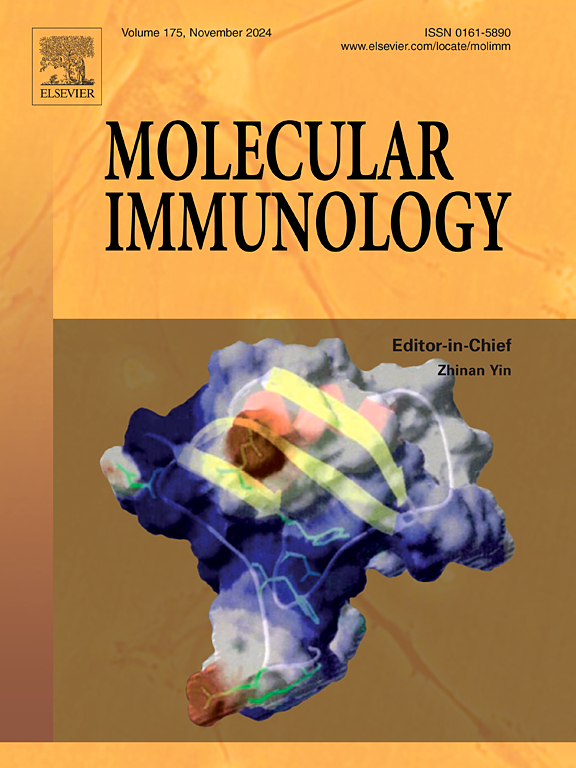布鲁氏菌脂多糖缺乏与脂质A诱导强大的T细胞免疫反应
IF 3.2
3区 医学
Q2 BIOCHEMISTRY & MOLECULAR BIOLOGY
引用次数: 0
摘要
布鲁氏菌是一种机会性细胞内寄生细菌,被归类为革兰氏阴性菌。脂多糖(LPS)是布鲁氏菌的主要毒力因子,包括脂质A、o抗原和核心多糖,其中脂质A是主要成分。布鲁氏菌脂多糖的非典型结构,以其长链脂肪酸而闻名,可能抑制宿主免疫反应,从而促进慢性疾病的发展。这些链诱导免疫抑制的机制尚不清楚。本研究旨在通过删除BacA基因来研究这些链。我们提取脂多糖体外刺激骨髓源性树突状细胞(bmdc),并与T细胞共培养诱导其增殖分化。通过血常规、CD4和CD8检测以及淋巴细胞刺激指数评估体内对LPS的免疫反应。我们的研究结果表明,野生型LPS (Bm-WT)在体外不引起免疫刺激反应;相反,它促进体内免疫抑制。相比之下,来自BacA基因突变的B. melitensis (Bm-ΔBacA)的LPS破坏了免疫抑制并促进了炎症因子的产生。这些发现强调了通过分子生物学技术修饰脂质A在推进细菌疫苗和佐剂方面的关键作用。本文章由计算机程序翻译,如有差异,请以英文原文为准。
Brucella lipopolysaccharide deficiency with lipid A induces robust T cells immune response
Brucella, an opportunistic intracellular parasitic bacterium, is classified as a Gram-negative organism. Lipopolysaccharide (LPS), as primary virulence factor of Brucella, includes lipid A, O-antigen, and core polysaccharide, with lipid A being the principal component. The atypical structure of Brucella LPS, noted for its very-long-chain fatty acids, may suppress the host immune response, thus facilitating chronic disease development. The mechanism by which these chains induce immunosuppression remains poorly understood.This study aimed to investigate these chains through deletion of the BacA gene. We extracted LPS to stimulate Bone Marrow-Derived Dendritic Cells (BMDCs) in vitro and co-cultured them with T cells to induce proliferation and differentiation. The in vivo immune response to LPS was evaluated through routine blood tests, CD4 and CD8 assays, and lymphocyte stimulation indices. Our findings demonstrate that wild-type LPS from B. melitensis (Bm-WT) does not elicit an immunostimulatory response in vitro; rather, it promotes immune suppression in vivo. In contrast, LPS derived from B. melitensis with a mutated BacA gene (Bm-ΔBacA) disrupts the immune suppression and encourages the production of inflammatory factors. These findings underscore the crucial role of modifying lipid A through molecular biology techniques to advance bacterial vaccines and adjuvants.
求助全文
通过发布文献求助,成功后即可免费获取论文全文。
去求助
来源期刊

Molecular immunology
医学-免疫学
CiteScore
6.90
自引率
2.80%
发文量
324
审稿时长
50 days
期刊介绍:
Molecular Immunology publishes original articles, reviews and commentaries on all areas of immunology, with a particular focus on description of cellular, biochemical or genetic mechanisms underlying immunological phenomena. Studies on all model organisms, from invertebrates to humans, are suitable. Examples include, but are not restricted to:
Infection, autoimmunity, transplantation, immunodeficiencies, inflammation and tumor immunology
Mechanisms of induction, regulation and termination of innate and adaptive immunity
Intercellular communication, cooperation and regulation
Intracellular mechanisms of immunity (endocytosis, protein trafficking, pathogen recognition, antigen presentation, etc)
Mechanisms of action of the cells and molecules of the immune system
Structural analysis
Development of the immune system
Comparative immunology and evolution of the immune system
"Omics" studies and bioinformatics
Vaccines, biotechnology and therapeutic manipulation of the immune system (therapeutic antibodies, cytokines, cellular therapies, etc)
Technical developments.
 求助内容:
求助内容: 应助结果提醒方式:
应助结果提醒方式:


